Loose Softbaits
Loose softbaits are a popular lure option for UK sea fishing, particularly for targeting predatory species such as bass, pollock, and wrasse. These lures come in a variety of shapes, sizes, and colours, allowing anglers to match the hatch and tempt their quarry with a range of enticing movements and realistic patterns. In this article, we will explore different techniques for using loose softbaits to catch bass, pollock, and wrasse, and offer some advice on selecting the best lures and equipment for the job.
What are Loose Softbaits?
Loose softbaits are artificial lures made from soft plastics that are designed to mimic the appearance and movement of natural prey. These lures are often referred to as “soft plastics” or “rubber baits” and come in a variety of forms, including shads, worms, grubs, and minnows. Some popular brands of loose softbaits include Savage Gear, Westin, and Berkley, to name just a few.
There are a number of advantages to using softbaits over traditional lures such as hardbaits or spoons. For one, softbaits are more versatile than other types of lures and can be used in a range of conditions. They are also less likely to spook fish and can be worked slowly and subtly, which can be especially effective when targeting wily species such as bass or wrasse.
Different Types of Loose Softbaits
As mentioned, loose softbaits come in a range of shapes and sizes, each with its own particular strengths and weaknesses. Below, we will outline some of the most popular types of softbaits used in UK sea fishing and discuss their suitability for different species and techniques.
Shads
Shads are soft plastic lures that are shaped like fish and typically feature a narrow tail that flutters and wiggles in the water. These lures are often fished with a jighead, which provides weight and enables the angler to control the depth and speed of the lure. Shads are particularly effective for catching bass and pollock, as their realistic swimming action can be irresistible to these predatory species.
Worms
Soft plastic worms are another popular type of loose softbait and are especially effective for catching wrasse. These lures are typically fished with a weedless hook, which enables them to be worked through rocky and weedy terrain without snagging. Wrasse are known to be particularly fond of ragworms, which can be replicated with a range of different worm-shaped softbaits.
Grubs
Grubs are soft plastic lures that are shaped like a small baitfish or worm and feature a fat, bulbous body that tapers down to a narrow tail. These lures can be fished with a jighead or Texas-rigged and are effective for catching a range of species, including bass, pollock, and wrasse. Grubs are typically worked with a slow, steady retrieve, allowing their realistic action to entice fish into striking.
Minnows
Soft plastic minnows are another versatile and popular type of loose softbait. These lures are typically fished with a jighead or Carolina rig and can be worked in a range of depths and speeds. Minnows are particularly effective for catching bass and pollock, and their realistic swimming action can be irresistible to these predatory species.
Techniques for Using Loose Softbaits
Now that we have explored some of the different types of loose softbaits available, let’s turn our attention to some of the techniques that can be used to catch bass, pollock, and wrasse with these lures.
Bass Fishing with Softbaits
Bass are a highly sought-after species in UK sea fishing, and loose softbaits can be a highly effective way to target these wily fish. When fishing for bass with softbaits, it is important to match the lure to the conditions and the behaviour of the fish. In general, bass prefer to feed close to the bottom, so fishing with a jighead or Carolina rig can be effective when targeting these fish.
One popular technique for bass fishing with loose softbaits is to work the lure with a slow, methodical retrieve. This allows the lure to mimic the movement of a wounded or dying fish, enticing the bass into striking. Another effective technique is to incorporate pauses and twitches into the retrieve, which can help to trigger a strike from a wary or inactive bass.
Pollock Fishing with Softbaits
Pollock are another popular species in UK sea fishing, and loose softbaits can be a highly effective way to catch these fish. When fishing for pollock, it is important to use a lure that mimics the shape and movement of the fish’s natural prey, such as a shad or minnow.
One of the most effective techniques for pollock fishing with softbaits is to cast the lure out and let it sink to the desired depth. Once the lure is near the bottom, a slow, steady retrieve can be used to imitate the movement of baitfish. Another effective technique is to jig the lure up and down to create an erratic movement that can trigger a strike from a hungry pollock.
Wrasse Fishing with Softbaits
Wrasse are a challenging and rewarding species to catch with loose softbaits. These fish are often found in rocky or weedy terrain, making them difficult to hook with traditional lures. However, soft plastic worms and grubs can be highly effective when targeting these elusive fish.
When wrasse fishing with softbaits, it is important to use a slow, subtle retrieve that allows the lure to imitate the movement of a natural prey item. The lure should be cast among rocks or weed beds and worked slowly through the area, allowing the wrasse to spot the lure and move in for a strike. As wrasse are known to be particularly finicky, it can be beneficial to vary the speed and movement of the lure to entice a strike.
Selecting the Right Equipment for Softbait Fishing
Finally, it is important to use the right equipment when fishing with loose softbaits in the UK sea. A good-quality rod and reel combo is essential for casting and retrieve the lure effectively, and a range of jigheads, hooks, and other terminal tackle can be used to add weight and control to the lure.
When selecting a rod and reel for softbait fishing, it is important to choose a setup that is balanced and suitably powerful for the species being targeted. A light to medium rod with a fast action and a spinning reel with a suitable line capacity can be a good option for most softbait fishing applications.
In conclusion, loose softbaits are a versatile and effective lure option for UK sea fishing, particularly for catching bass, pollock, and wrasse. By matching the lure to the conditions and employing a range of different techniques, anglers can use these lures to catch a range of predatory species and enjoy the thrill of the catch.
-

Berkley Gulp Peeler Crab 5cm
£7.99 -
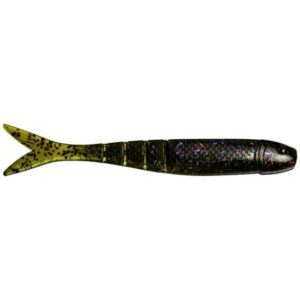
Strike King Perfect Plastics With Coffee Scent & Salt Blade Minnow
£4.99 -

Savage Gear Gravity Stick Mini Kit
£9.99 -
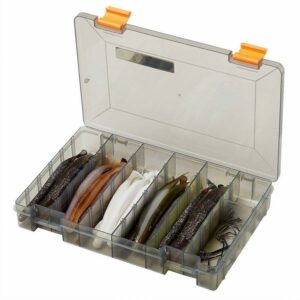
Savage Gear Gravity Stick Kit 47 pieces
£22.99 -
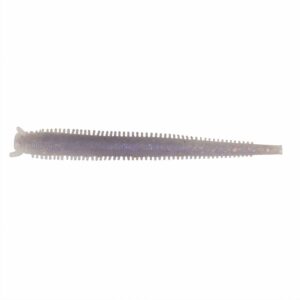
Berkley Gulp Fat Sandworm 4″
£8.99 – £9.99 -
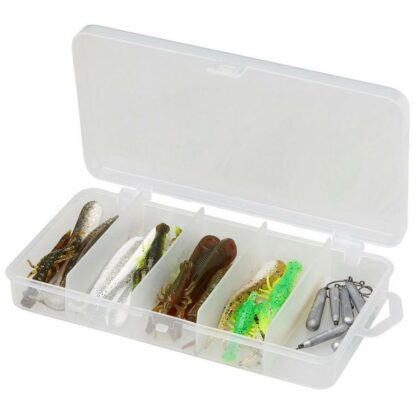
Savage Gear 36 pcs Dropshot Accademy Kit
£18.99 -
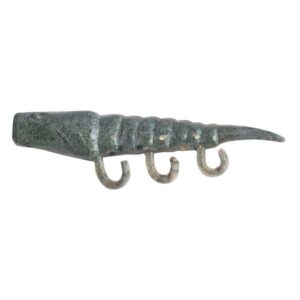
Berkley Gulp Turbo Shrimp 5cm
£11.99 -
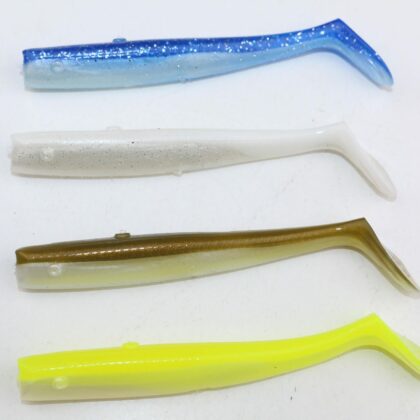
Savage Gear Sandeel V2 Tails 12.5cm 15g
£4.99 -

Savage Gear Sandeel V2 Tails 11cm 10g
£4.99 -

AXIA Acme Shad 3″ Pkt 12
£2.99 -

Hill Climb Rolling Shad L – 13cm 12g
£12.49 -

Sawamura One Up Slug 5 – 12.5cm 8g
£13.99
Loose softbaits are a popular lure option for UK sea fishing, particularly for targeting predatory species such as bass, pollock, and wrasse. These lures come in a variety of shapes, sizes, and colours, allowing anglers to match the hatch and tempt their quarry with a range of enticing movements and realistic patterns. In this article, we will explore different techniques for using loose softbaits to catch bass, pollock, and wrasse, and offer some advice on selecting the best lures and equipment for the job.
What are Loose Softbaits?
Loose softbaits are artificial lures made from soft plastics that are designed to mimic the appearance and movement of natural prey. These lures are often referred to as “soft plastics” or “rubber baits” and come in a variety of forms, including shads, worms, grubs, and minnows. Some popular brands of loose softbaits include Savage Gear, Westin, and Berkley, to name just a few.
There are a number of advantages to using softbaits over traditional lures such as hardbaits or spoons. For one, softbaits are more versatile than other types of lures and can be used in a range of conditions. They are also less likely to spook fish and can be worked slowly and subtly, which can be especially effective when targeting wily species such as bass or wrasse.
Different Types of Loose Softbaits
As mentioned, loose softbaits come in a range of shapes and sizes, each with its own particular strengths and weaknesses. Below, we will outline some of the most popular types of softbaits used in UK sea fishing and discuss their suitability for different species and techniques.
Shads
Shads are soft plastic lures that are shaped like fish and typically feature a narrow tail that flutters and wiggles in the water. These lures are often fished with a jighead, which provides weight and enables the angler to control the depth and speed of the lure. Shads are particularly effective for catching bass and pollock, as their realistic swimming action can be irresistible to these predatory species.
Worms
Soft plastic worms are another popular type of loose softbait and are especially effective for catching wrasse. These lures are typically fished with a weedless hook, which enables them to be worked through rocky and weedy terrain without snagging. Wrasse are known to be particularly fond of ragworms, which can be replicated with a range of different worm-shaped softbaits.
Grubs
Grubs are soft plastic lures that are shaped like a small baitfish or worm and feature a fat, bulbous body that tapers down to a narrow tail. These lures can be fished with a jighead or Texas-rigged and are effective for catching a range of species, including bass, pollock, and wrasse. Grubs are typically worked with a slow, steady retrieve, allowing their realistic action to entice fish into striking.
Minnows
Soft plastic minnows are another versatile and popular type of loose softbait. These lures are typically fished with a jighead or Carolina rig and can be worked in a range of depths and speeds. Minnows are particularly effective for catching bass and pollock, and their realistic swimming action can be irresistible to these predatory species.
Techniques for Using Loose Softbaits
Now that we have explored some of the different types of loose softbaits available, let’s turn our attention to some of the techniques that can be used to catch bass, pollock, and wrasse with these lures.
Bass Fishing with Softbaits
Bass are a highly sought-after species in UK sea fishing, and loose softbaits can be a highly effective way to target these wily fish. When fishing for bass with softbaits, it is important to match the lure to the conditions and the behaviour of the fish. In general, bass prefer to feed close to the bottom, so fishing with a jighead or Carolina rig can be effective when targeting these fish.
One popular technique for bass fishing with loose softbaits is to work the lure with a slow, methodical retrieve. This allows the lure to mimic the movement of a wounded or dying fish, enticing the bass into striking. Another effective technique is to incorporate pauses and twitches into the retrieve, which can help to trigger a strike from a wary or inactive bass.
Pollock Fishing with Softbaits
Pollock are another popular species in UK sea fishing, and loose softbaits can be a highly effective way to catch these fish. When fishing for pollock, it is important to use a lure that mimics the shape and movement of the fish’s natural prey, such as a shad or minnow.
One of the most effective techniques for pollock fishing with softbaits is to cast the lure out and let it sink to the desired depth. Once the lure is near the bottom, a slow, steady retrieve can be used to imitate the movement of baitfish. Another effective technique is to jig the lure up and down to create an erratic movement that can trigger a strike from a hungry pollock.
Wrasse Fishing with Softbaits
Wrasse are a challenging and rewarding species to catch with loose softbaits. These fish are often found in rocky or weedy terrain, making them difficult to hook with traditional lures. However, soft plastic worms and grubs can be highly effective when targeting these elusive fish.
When wrasse fishing with softbaits, it is important to use a slow, subtle retrieve that allows the lure to imitate the movement of a natural prey item. The lure should be cast among rocks or weed beds and worked slowly through the area, allowing the wrasse to spot the lure and move in for a strike. As wrasse are known to be particularly finicky, it can be beneficial to vary the speed and movement of the lure to entice a strike.
Selecting the Right Equipment for Softbait Fishing
Finally, it is important to use the right equipment when fishing with loose softbaits in the UK sea. A good-quality rod and reel combo is essential for casting and retrieve the lure effectively, and a range of jigheads, hooks, and other terminal tackle can be used to add weight and control to the lure.
When selecting a rod and reel for softbait fishing, it is important to choose a setup that is balanced and suitably powerful for the species being targeted. A light to medium rod with a fast action and a spinning reel with a suitable line capacity can be a good option for most softbait fishing applications.
In conclusion, loose softbaits are a versatile and effective lure option for UK sea fishing, particularly for catching bass, pollock, and wrasse. By matching the lure to the conditions and employing a range of different techniques, anglers can use these lures to catch a range of predatory species and enjoy the thrill of the catch.
100% Original product that covered warranty by the vendor.
You have the right to return your orders within 30 days.
Your orders are shipped seamlessly between countries.
Your payments are secure with our private security network.
